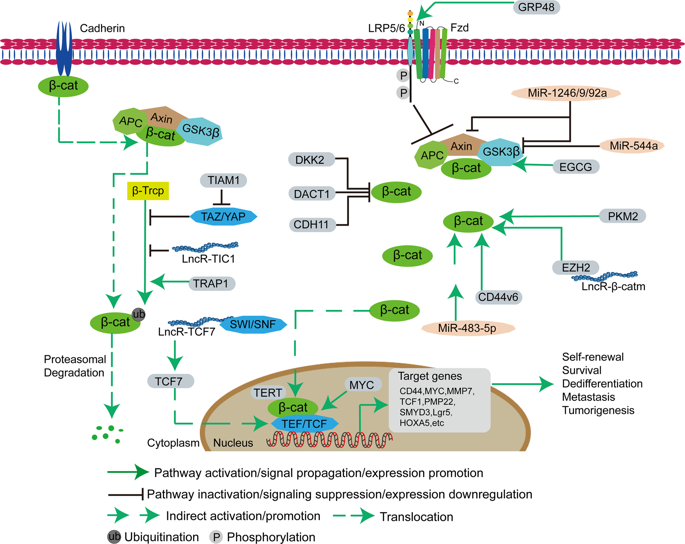当前位置:
X-MOL 学术
›
Signal Transduct. Target Ther.
›
论文详情
Our official English website, www.x-mol.net, welcomes your
feedback! (Note: you will need to create a separate account there.)
Targeting cancer stem cell pathways for cancer therapy.
Signal Transduction and Targeted Therapy ( IF 40.8 ) Pub Date : 2020-02-07 , DOI: 10.1038/s41392-020-0110-5 Liqun Yang 1, 2 , Pengfei Shi 1, 2 , Gaichao Zhao 1, 2 , Jie Xu 1, 2 , Wen Peng 1, 2 , Jiayi Zhang 1, 2 , Guanghui Zhang 1, 2 , Xiaowen Wang 1, 2 , Zhen Dong 1, 2 , Fei Chen 3 , Hongjuan Cui 1, 2
Signal Transduction and Targeted Therapy ( IF 40.8 ) Pub Date : 2020-02-07 , DOI: 10.1038/s41392-020-0110-5 Liqun Yang 1, 2 , Pengfei Shi 1, 2 , Gaichao Zhao 1, 2 , Jie Xu 1, 2 , Wen Peng 1, 2 , Jiayi Zhang 1, 2 , Guanghui Zhang 1, 2 , Xiaowen Wang 1, 2 , Zhen Dong 1, 2 , Fei Chen 3 , Hongjuan Cui 1, 2
Affiliation

|
Since cancer stem cells (CSCs) were first identified in leukemia in 1994, they have been considered promising therapeutic targets for cancer therapy. These cells have self-renewal capacity and differentiation potential and contribute to multiple tumor malignancies, such as recurrence, metastasis, heterogeneity, multidrug resistance, and radiation resistance. The biological activities of CSCs are regulated by several pluripotent transcription factors, such as OCT4, Sox2, Nanog, KLF4, and MYC. In addition, many intracellular signaling pathways, such as Wnt, NF-κB (nuclear factor-κB), Notch, Hedgehog, JAK-STAT (Janus kinase/signal transducers and activators of transcription), PI3K/AKT/mTOR (phosphoinositide 3-kinase/AKT/mammalian target of rapamycin), TGF (transforming growth factor)/SMAD, and PPAR (peroxisome proliferator-activated receptor), as well as extracellular factors, such as vascular niches, hypoxia, tumor-associated macrophages, cancer-associated fibroblasts, cancer-associated mesenchymal stem cells, extracellular matrix, and exosomes, have been shown to be very important regulators of CSCs. Molecules, vaccines, antibodies, and CAR-T (chimeric antigen receptor T cell) cells have been developed to specifically target CSCs, and some of these factors are already undergoing clinical trials. This review summarizes the characterization and identification of CSCs, depicts major factors and pathways that regulate CSC development, and discusses potential targeted therapy for CSCs.
中文翻译:

针对癌症治疗的癌症干细胞途径。
自 1994 年首次在白血病中发现癌症干细胞 (CSC) 以来,它们一直被认为是癌症治疗的有希望的治疗靶点。这些细胞具有自我更新能力和分化潜力,导致多种肿瘤恶性肿瘤,如复发、转移、异质性、多药耐药性和放射抗性。 CSCs的生物活性受到多种多能转录因子的调节,例如OCT4、Sox2、Nanog、KLF4和MYC。此外,许多细胞内信号通路,如Wnt、NF-κB(核因子-κB)、Notch、Hedgehog、JAK-STAT(Janus激酶/信号转导器和转录激活子)、PI3K/AKT/mTOR(磷酸肌醇3-激酶/AKT/雷帕霉素哺乳动物靶标)、TGF(转化生长因子)/SMAD 和 PPAR(过氧化物酶体增殖物激活受体),以及细胞外因子,如血管生态位、缺氧、肿瘤相关巨噬细胞、癌症相关细胞成纤维细胞、癌症相关间充质干细胞、细胞外基质和外泌体已被证明是 CSC 非常重要的调节因子。已经开发出专门针对 CSC 的分子、疫苗、抗体和 CAR-T(嵌合抗原受体 T 细胞)细胞,其中一些因子已经正在进行临床试验。本综述总结了 CSC 的特征和鉴定,描述了调节 CSC 发展的主要因素和途径,并讨论了 CSC 的潜在靶向治疗。
更新日期:2020-02-07
中文翻译:

针对癌症治疗的癌症干细胞途径。
自 1994 年首次在白血病中发现癌症干细胞 (CSC) 以来,它们一直被认为是癌症治疗的有希望的治疗靶点。这些细胞具有自我更新能力和分化潜力,导致多种肿瘤恶性肿瘤,如复发、转移、异质性、多药耐药性和放射抗性。 CSCs的生物活性受到多种多能转录因子的调节,例如OCT4、Sox2、Nanog、KLF4和MYC。此外,许多细胞内信号通路,如Wnt、NF-κB(核因子-κB)、Notch、Hedgehog、JAK-STAT(Janus激酶/信号转导器和转录激活子)、PI3K/AKT/mTOR(磷酸肌醇3-激酶/AKT/雷帕霉素哺乳动物靶标)、TGF(转化生长因子)/SMAD 和 PPAR(过氧化物酶体增殖物激活受体),以及细胞外因子,如血管生态位、缺氧、肿瘤相关巨噬细胞、癌症相关细胞成纤维细胞、癌症相关间充质干细胞、细胞外基质和外泌体已被证明是 CSC 非常重要的调节因子。已经开发出专门针对 CSC 的分子、疫苗、抗体和 CAR-T(嵌合抗原受体 T 细胞)细胞,其中一些因子已经正在进行临床试验。本综述总结了 CSC 的特征和鉴定,描述了调节 CSC 发展的主要因素和途径,并讨论了 CSC 的潜在靶向治疗。











































 京公网安备 11010802027423号
京公网安备 11010802027423号